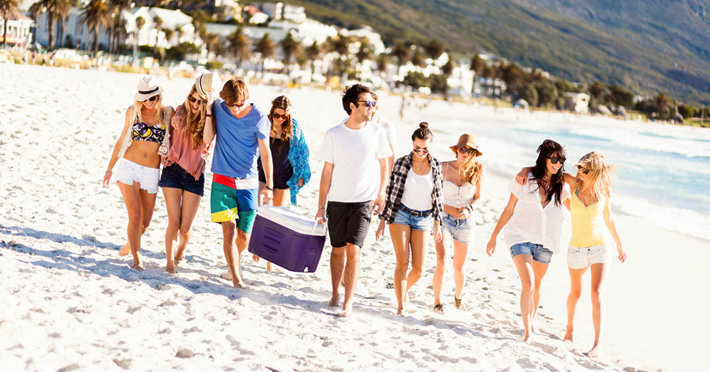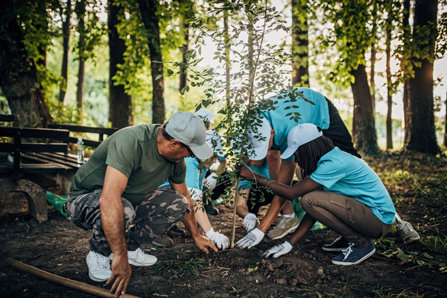A Changing Landscape – How to Stay Sober While the World Opens Up During Summer

Two significant events are occurring right now that pose considerable risk to sober or recently recovered individuals. These are:
1) The world is beginning to open up again in a post-Covid setting.
2) This reopening is occurring during summer, the season when people are most likely to misuse substances and experiment with mind-altering drugs.
The summer season, much like the holidays, has always been a season in which recovering addicts must exercise caution in protecting their sobriety. The summer is when many Americans get together for parties, barbecues, weekend trips, nights out on the town, etc. And while every summer has this as an inherent feature, the summer of 2021 is particularly dangerous for recovering addicts. Americans across the country are recreating and partying en masse, their way of celebrating after a year mired in the Covid-19 pandemic.
These two factors create a perfect storm for people in recovery. Thankfully, there are several strategies and tips that recovering addicts can implement in their day-to-day lives to protect their hard-won freedom from drugs and alcohol.
What Can a Recovering Addict Do to Protect Their Sobriety This Summer?
Though the subject is not yet thoroughly researched, preliminary scientific data does suggest that Americans are more likely to use substances during the summer. One press release cited Dr. Joseph J. Palamar’s research on the subject, a thorough study of designer drug use trends during the different seasons in New York State. Dr. Palamar’s study found that 34% of first-time use of LSD in New York occurred during summer. Similar trends were present for other drugs like marijuana (30% of first-time use is during the summer), ecstasy (30%), and cocaine (28%).

If one’s peers are more likely to use drugs or drink alcohol to excess during the summer, how can someone in recovery navigate a summer season where his or her social groups may be drinking too much alcohol and possibly using drugs? Following are ten tips for a sober summer:
- Make some changes. It’s not easy to start living for the better while still doing the same old routine. It may be a good idea to change up one’s friends group during the summer and seek out like-minded, sober, empathetic friends with whom one can do fun, substance-free activities.
- Foster healthy relationships. There is no room for unhealthy relationships in a quest for recovery, especially during the summer when recovering addicts need a safety net to help keep their spirits up. Make sure to foster only good, healthy, beneficial relationships this summer.
- Get physically active. Exercising releases endorphins, producing a sort of natural high. Furthermore, exercising can help repair years of damage caused by drug use or alcohol misuse. Exercising also reduces stress which is a major trigger for relapse.
- Dive into work, school, and family. When recovering addicts have something productive, meaningful, and worthwhile to fill their time, they’re less likely to relapse.
- Travel with other sober, like-minded friends. As borders and travel opportunities open up again, Americans are excited to get out and see the world. Unfortunately, this often comes with a fair amount of revelry and a potential for substance abuse. For those in recovery, it’s recommended that they travel with other like-minded individuals.
- Spend the summer improving the home, yard, and garden. Outlets that can foster sobriety and improve one’s living space at the same time include home improvements, landscaping, gardening, and taking care of seasonal maintenance around the house. Not only do these activities help fill one with a sense of accomplishment, but they also keep one away from groups or activities where drinking or drug use may be taking place.

- Engage in meaningful work, such as volunteering. The summer months often come with more free time. But rather than spend this time recreating, why not give back to the community? Volunteering can help build strength in recovery, in addition to being a valuable gift to others.
- Learn about preventing drug and alcohol relapse. Continuing education in drug and alcohol addiction and recovery helps strengthen one’s recovery. Reading books about recovery and learning more about the harms of addiction help remind one why they got clean in the first place.
- Help others get clean. One of the greatest rewards for a recovering addict comes from helping others achieve sobriety. Not only is this an incredibly meaningful and worthwhile endeavor, but helping others get off drugs can also help build strength in one’s own recovery.
- Utilize healthy coping strategies to maintain sobriety. If the summer becomes stressful, recovering addicts should remember to draw on the healthy coping strategies they’ve used to stay sober in the past. If those strategies don’t seem to be working, recovering addicts should seek new, healthy ways to stay away from drugs and alcohol.
The path through addiction recovery unfolds differently for everyone. A series of strategies may prove highly effective for one person but not be as meaningful or impactful for another. If you or someone you care about is in recovery but they’re feeling like a relapse is just around the corner (and you’re unsure what you can do to help), you can always reach out to a qualified drug and alcohol rehab center.
Does Addiction Have to Last Forever?
During challenging moments like these, a summer season with revelers out en masse celebrating the recession of Covid-19, recovering addicts may feel like they can never catch a break, like they are doomed to a life that revolves around protecting their recovery.
For most people, it gets better as time goes on. The more years one can stay sober from a particular drug, the less likely they are to relapse back onto that drug (assuming they are maintaining healthy life habits in other areas too, i.e., not replacing one unhealthy habit with another). One study even provided compelling data that people who do achieve recovery from an addiction to a substance and who are sober for some time tend to maintain their recovery. Quoting the authors, “As compared with those who do not remit from an SUD, remitters (people who stop using drugs) have less than half the risk of developing a new SUD.” From that data, we can surmise that when people get off of a drug and stay off that drug for some time, they’re usually able to maintain their recovery.
Thankfully, addiction does not have to last forever. And though risks for relapse may be present during the summer months, recovering addicts who follow a plan and live by their recovery goals protect themselves from such risks.
If you or someone you care about is recovering from drug or alcohol addiction, don’t let the spike in summertime revelry get the best of you. And if you or someone you care about is currently using drugs, get help from a qualified drug and alcohol rehab center as soon as possible.
Sources:
- https://nyulangone.org/news/people-are-more-likely-try-drugs-first-time-during-summer
- https://pubmed.ncbi.nlm.nih.gov/32050110/
- https://jamanetwork.com/journals/jamapsychiatry/fullarticle/1901525


 ®
®